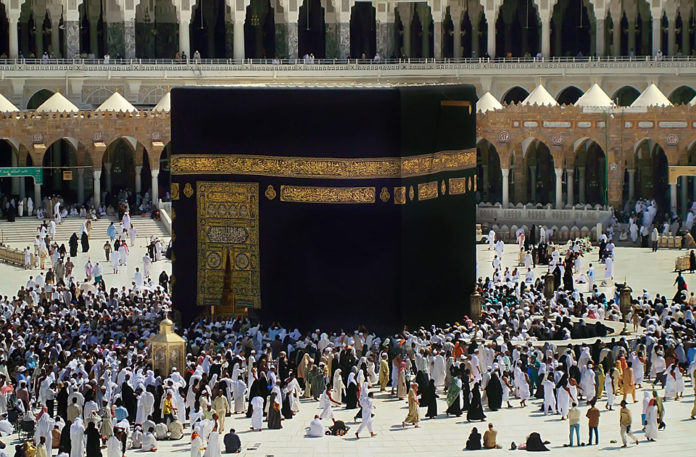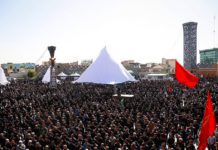In the early days of Islâm, those that believed in Rasûl Allâh – sal Allâh u
alayhi wa sallam – and the message of Lâ ilâha illah Allâh , were tested in
the core of their faith. Every means of punishment was inflicted upon them.
In those young days, Khabbab ibn Al-Arat, radi Allâh u ‘anhu, came to Rasûl
Allâh – sal Allâh u alayhi wa sallam – and remarked, “Won’t you pray for us!
Won’t you seek help from Allâh for victory over these people!”
Rasûl Allâh – sal Allâh u alayhi wa sallam – turned to him and said,
| “There were believers that came before us, they would be cut from the top of their head right down their body – others were combed with iron rakes, their skin separated from their muscles separated from their bones … but all that did not cause them to renounce their faith. But nay ye are hasty.” |
Allâh ta’ala revealed:
| [Or did you reckon you will enter Jannah when the same thing never happened to you such as happened to those who have passed away before you? Suffering and hardship assailed them, and they were battered about until the Messenger and those who believed along with him said, ‘When is Allâh ‘s support?’ Indeed Allâh ‘s support is near.] – sûrah Al Baqarah 2/214 |
| [O ye who believe! Fasting was prescribed for you as it was prescribed for those before you so that you may become pious.] |
| “Whoever races you in your Dîn, then race them; Whoever races you in their Dunya, throw it back in their face.” |
Wuhayb ibn Al-Wird said,
| “If you can, do not allow anyone to beat you to Allâh ‘s pleasure.” |
And Ash-Shaykh Shamsuddin Al-Turkistânî said,
| “If news every came to me that someone had done something for the pleasure of Allâh , I would always do exactly what that person did and then some.” |
Compare this now to Arab countries that have received news of the Guiness
book of World records and are spending their time and the Ummah’s wealth to
outdo those records. Wallâhul Musta’ân.
Hammad ibn Salamah said,
| “We have seen Sulaymân At-Tîmî in a moment of worship to Allâh , except that he was participating in that worship. If it was time for Salah, we would see him in Salah. If it was other than the Salah time, he would be either making wudu or visiting the sick, or following a funeral procession, or reflecting in the Masjid. Such much so, that we actually thought he didn’t know how to disobey Allâh .” |
(c) Da’wah and Jihâd
Allâh ta’ala tells us in the Qurân of the strenuous concern Rasûl Allâh –
sal Allâh u alayhi wa sallam – had for the people’s acceptance of this Dîn.
| [Tâ, Sîn, Mîm / These are the verses of the clear Book / Perhaps, (O Muhammad), you would kill yourself with grief that they will not be believers. / If We willed, We could send down to them from the sky a sign for which their necks would remain humbled. / And no mention comes to them anew from the Most Merciful except that they turn away from it.] Sûrah Shura 26/1-5 |
| “What if all these people on the day of judgement come and say as their excuse, ‘O Allâh , here the Muslims lived all around us and they never came to tell us about this Dîn.’” |
Indeed
the matter is grave.
Ja’far ibn Sulaymân said,
| “I hear Malik ibn Dînar saying, ‘If I was capable of never sleeping I would never sleep for fear that Allâh ‘s wrath would befall me while I am sleeping. And had I those that would assist me I would send them all around the world to announce: O humanity, save yourselves from Hellfire, save yourselves from Hellfire!'” |
And when it came to defending the Dîn of Allâh , we see the example of Rasûl
Allâh – sal Allâh u alayhi wa sallam – shining for all those who would wish to
be guided by it.
Ali – radi Allâh u ‘anhu – said,
| “Whenever the battle would intensify, and the swords began to burn red, we would seek shield from Rasûl Allâh – sal Allâh u alayhi wa sallam. There was no one closer to the enemy ranks than him.” |
And ‘Imrân ibn al-Husayn – radi Allâh u ‘anhu – said,
| “Whenever the Muslim battalion would encounter the enemy, Rasûl Allâh – sal Allâh u alayhi wa sallam – was always the first one to strike.” |
There is a principal that we spoke about earlier: Al-Maysûr Lâ YasQut bil
Ma’sûr. It means: What one finds easy is not cancelled by what is difficult;
i.e. those things that the Mukallaf can do with ease does not get cancelled
just because he or she cannot do what is hard upon them.
Examples of this in Fiqh include: If someone knows a few verses of AlFâtiha,
then they must read it in Salah. Just because they do not know the whole
Sûrah does not mean they don’t have to read the verses they CAN recite.
If a person is in such a situation that he cannot cover his complete private
area during Salah, then he must cover whatever he can. Just because he cannot
cover the entire area does not cancel the obligation to cover what he can.
If a person is not capable of performing Sajdah, that doesn’t mean he can
sit down throughout the entire Salah if he is capable of standing for Ruku’
or Qiyâm.
When it comes to studying the Qurân and Sunnah, Ibâdah, and Da’wah
you’ll see that many people focus on the ideal which is unattainable for them
at that moment. Then they say to themselves, since it is unattainable then I
just have to be patient and do nothing. No, keep moving a step down until you
find what is attainable and do it.
If you can’t memorize the Qurân by next Ramadân, you can for sure finish 2
Juz’. If you can’t do 2 Juz’ in one year, then you can do one. If one is all
you can do, then do it. In sha’ Allâh , 30 years from now you would be Hafidh
al-Qurân.
If you can’t come to every Minhâj-ul Muslim Halaqah all year long, doesn’t
mean that you come to none.
If the Masjid is far away from your home and it’s hard to come for every
Salah, doesn’t mean you never come to the Masjid. Come for Maghrib and stay
for Isha or something similar.
The proof of this is the words of Rasûl Allâh – sal Allâh u alayhi wa sallam,
“What I command you in, perform what you are capable of.”
In conclusion, there are three ingredients to making your resolution to
improve yourself successful.
- Have a truthful determination.
- Be economical in what you decide to do.
- Make dua to Allâh to make your effort successful.

SUBSCRIBE AND LEARN...
- Fresh articles
- Increase your Islamic knowledge
- Build a Powerful Connection with Allah

















































